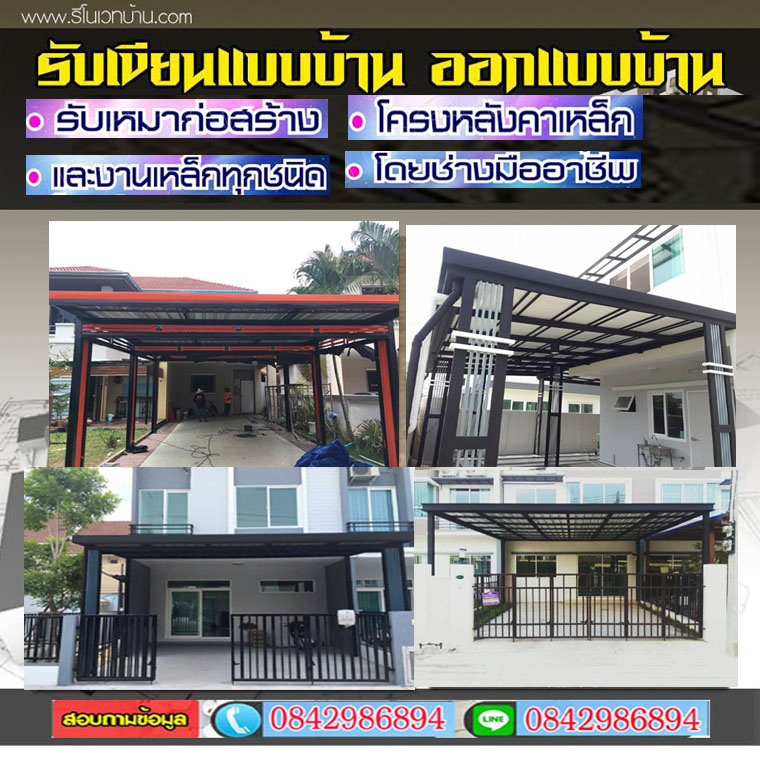
ข้อเสียหลังคาชนิดต่างๆมีอะไรบ้าง
1. Polycarbonate (โพลีคาร์บอเนต)
แผ่น Polycarbonate หรือ PC นั้นมีน้ำหนักเบา และมีสีสันให้เลือกหลากหลาย ทนต่อการเปลี่ยนแปลงของสภาพอากาศได้เป็นอย่างดี ยืดหยุ่นสูงสามารถดัดโค้งได้โดยไม่ต้องพึ่งความร้อน เมื่อเคลือบผิวด้วยสารดูดซับแสง UV จะทำให้มีประสิทธิภาพในการป้องกันความร้อนได้เกือบ 100%
ข้อเสียของแผ่น PC นั้นคือ ตัวแผ่นที่มีลักษณะแบบลูกฟูกซึ่งทำให้สามารถเก็บกักความชื้นได้ ส่งผลให้เกิดไอน้ำ ตะไคร่ และความขุ่นมัว จึงไม่เหมาะอย่างยิ่งกับการนำไปมุงเป็นหลังคาบ้าน ที่สำคัญราคาค่อนข้างสูง โดยเฉลี่ยอยู่ที่ประมาณ 1,200-2,400 บาทต่อตารางเมตร
สรุปข้อดี ข้อเสีย ของ โพลีคาร์บอเนต
ข้อดี สวยงาม, หลายสี , เคลือบสารกัน UV, มีหลายเกรดเลือกได้ตามงบ
ข้อเสีย ใต้ชายคายังร้อนเพราะแสงส่องผ่านได้, แสงส่องผ่านมีสีเข้มตามสีแผ่น(แผ่นเขียว แสงเขียว), ฝนตกเสียงดังป๊อกๆ แป๊กๆ
2. FRP: Fiberglass Reinforced Plastics (ไฟเบอร์กลาส)
คือ การนำใยแก้วและโพลีเอสเตอร์เรซินชนิดพิเศษ มาเป็นวัตถุดิบของการผลิตหลังคาโปร่งแสง ทำให้แผ่นวัสดุมีความแข็งแรงและยืดหยุ่นขึ้น สามารถดัดโค้งได้
3. UPVC: Unplasticized Polyvinyl Chloride (ยูพีวีซี)
UPVC เป็น PVC ที่ถูกนำเอาความเป็นพลาสติกออกไป ทำให้มีเนื้อวัสดุที่ได้ไม่ค่อยยืดหยุ่นแต่แข็งแรง มีทั้งแบบสีขาวขุ่นและแบบผสมสี คุณสมบัติของ UPVC นอกจากจะไม่ดูดซับความชื้นแล้ว ยังป้องกันความร้อนได้ค่อนข้างต่ำ
UPVC มีน้ำหนักเบา ติดตั้งได้ง่ายเหมือนการมุงหลังคาทั่วไป ราคาของ UPVC ไม่รวมติดตั้งนั้นอยู่ที่ตารางเมตรละประมาณ 300 บาท ข้อเสียที่ต้องคำนึงถึงก็คือเมื่อผ่านการใช้งานเนื้อสีขาวขุ่นของ UPVC อาจจะเปลี่ยนสีได้ และสำหรับวัสดุสีขาวขุ่นนั้นแสงแดดจะสามารถส่องผ่านได้เพียง 40% เท่านั้น ซึ่งอาจจะทำให้พื้นที่ไม่ได้รับความสว่างเท่าที่ควร
สรุปข้อดี ข้อเสีย ของ UPVC
-ข้อดี วัสดุแข็งแรง มีน้ำหนักเบา ติดตั้งได้ง่าย
-ข้อเสีย ป้องกันความร้อนได้น้อย
4. ACRYLIC (อะคริลิก)
เหมาะกับงานสไตล์โมเดิร์นเพราะมีผิวที่เรียบโปร่งใสคล้ายกระจก และด้วยความที่เป็นเนื้อพลาสติกจึงสามารถขึ้นรูปแบบต่างๆ ได้ด้วย โดยทั่วไปอะคริลิกจะทนต่อรังสีอัลตราไวโอเลตได้ดี จึงเหมาะกับการใช้งานภายนอก มีความแข็งแรงทนทานพอสมควรแต่จะทนแรงกระแทกได้น้อยกว่าโพลีคาร์บอเนต อย่างไรก็ตาม ในปัจจุบัน มีการพัฒนาแผ่นอะคริลิกที่มีที่มีคุณสมบัติด้านต่างๆ ดียิ่งขึ้น ไม่ว่าจะเป็นเรื่องความทนทานต่อแสงแดด แรงกระแทก และอายุการใช้งาน ทั้งยังมี รุ่นที่สามารถลดความร้อนจากแสงแดดได้ในตัวโดยไม่ต้องติดฟิล์มเพิ่ม ซึ่งเหมาะมากกับบ้านที่ต้องการความสวยงาม ทนทาน และประหยัดพลังงานไปพร้อมๆ กัน


ติดต่อช่าง


1. Polycarbonate (polycarbonate)
Polycarbonate or PC sheet is lightweight. And there are many colors to choose from. Good resistance to weather changes Highly flexible, can be bent without heat When coated with a UV absorbent, the heat protection efficiency is almost 100%.
The disadvantage of PC sheet is its corrugated body which allows it to retain moisture. This results in steam, algae and cloudiness. Therefore, it is not suitable for the roof of the house. Importantly, the price is quite high. The average is about 1,200-2,400 baht per square meter.
Summary of advantages and disadvantages of polycarbonate
Advantages: beautiful, many colors, coated with UV protection, there are many grades to choose according to the budget
Disadvantages under the eaves are still hot because the light can pass through, the light shines through the dark color according to the color of the sheet (green sheet, green light), the rain makes a popping noise
2. FRP: Fiberglass Reinforced Plastics (Fiberglass)
Is a special type of glass fiber and polyester resin as a raw material for the production of translucent roofs This makes the sheet material stronger and more flexible. Can be bent
3. U PVC: Plasticized Polyvinyl Chloride (U PVC)
U PVC is PVC with the plasticity removed. Makes a material that is not flexible but strong. There are both opaque white and color combinations. The properties of U PVC in addition to not absorbing moisture. It also protects against heat quite low.
U PVC is lightweight and easy to install like general roofing. The price of U PVC not including installation is about 300 baht per square meter. Can change color And for an opaque material, sunlight can only pass through 40%, which may cause the area to not be as bright as it should be.
Summary of advantages and disadvantages of U PVC
-Advantages: Strong material, light weight, easy to install.
- Disadvantages: less heat protection
4. ACRYLIC (acrylic)
Suitable for modern style work because it has a smooth, transparent surface like glass. And because it is plastic, it can be molded into various forms as well. In general, acrylic is resistant to ultraviolet rays. Therefore, suitable for external use It is durable enough but will withstand less impact than polycarbonate. And service life. There is also a model that can reduce heat from sunlight in the body without adding film. Which is very suitable for homes that want beauty, durability and energy saving at the same time.


ติดต่อช่าง


1.聚碳酸酯(聚碳酸酯)
聚碳酸酯或 PC 板重量轻。并且有多种颜色可供选择。良好地耐气候变化性 高度柔韧,无需加热即可弯曲 当涂有紫外线吸收剂时,热防护效率几乎为 100%。
PC板的缺点是它的波纹体可以保持水分。这会导致蒸汽、藻类和混浊。因此,它不适合用于房屋的屋顶。重要的是,价格相当高。平均价格约为每平方米 1,200-2,400 泰铢。
聚碳酸酯优缺点总结
优点:漂亮,颜色很多,涂有防紫外线,有很多档次可以根据预算选择。
缺点是屋檐下还是热的,因为光线可以通过,光线照到根据片材颜色的暗色(绿片材,绿光),下雨有啪啪啪的声音。
2. FRP:玻璃纤维增 强塑料(Fiberglass)
是一种特殊类型的玻璃纤维和聚酯树脂作为生产半透明屋顶的原材料,这使得板材更坚固、更灵活。可以弯曲
3. U PVC:增塑聚氯乙烯(U PVC)
U PVC是去除了可塑性的PVC。制造一种不灵活但坚固的材料。有不透明的白色和颜色组合。U PVC的特性除了不吸潮。它还可以防止热量很低。
U PVC 与一般屋面一样轻巧且易于安装。U PVC 不包括安装的价格约为每平方米 300 泰铢。可以改变颜色对于不透明的材料,阳光只能通过 40%,这可能会导致该区域没有应有的明亮。
U PVC优缺点总结
-优点:材质坚固,重量轻,安装方便。
- 缺点:热保护较少
4. ACRYLIC(亚克力)
适合现代风格的工作,因为它具有像玻璃一样光滑、透明的表面。而且因为它是塑料的,所以它也可以被塑造成各种形式。一般来说,亚克力是抗紫外线的。因此,适合外用 它足够耐用,但比聚碳酸酯承受的冲击力要小。和使用寿命。还有一种模型可以在不添加薄膜的情况下减少体内来自阳光的热量。非常适合同时追求美观、耐用、节能的家居。

